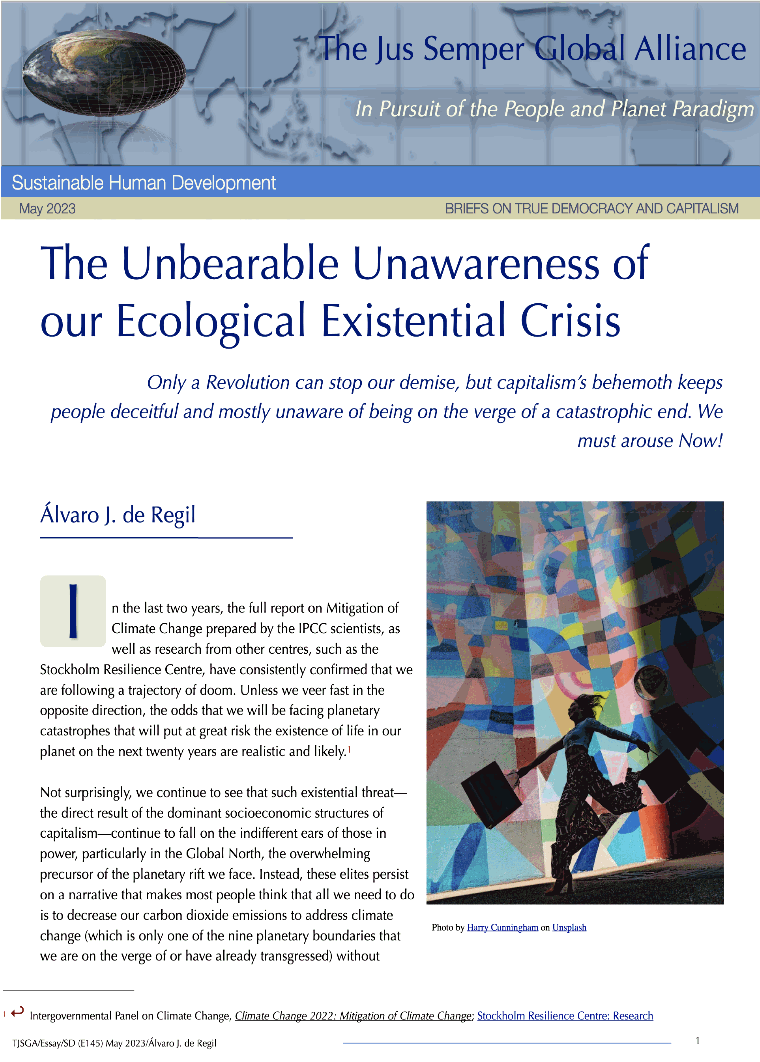our Ecological Existential Crisis Only a Revolution can stop our demise, but capitalism’s behemoth keeps people deceitful and mostly unaware of being on the verge of a catastrophic end. We must arouse Now!
Not surprisingly, we continue to see that such existential threat— the direct result of the dominant socioeconomic structures of capitalism—continue to fall on the indifferent ears of those in power, particularly in the Global North, the overwhelming precursor of the planetary rift we face. Instead, these elites persist on a narrative that makes most people think that all we need to do is to decrease our carbon dioxide emissions to address climate change (which is only one of the nine planetary boundaries that we are on the verge of or have already transgressed) without changing the consumeristic lifestyle systems required for capitalism to sustain itself. They push, explicitly and implicitly, the idea that Promethean technological prowess will solve our problems, such as the fact that we are well underway of the Sixth Mass Extinction, so that we can confidently continue to pursue our consumeristic impulses in our quest for happiness. Based on the track record delivered by the centers of power, it is evident that humans and nonhumans will surely reach our demise in the next few decades unless the common people rid themselves of the delusional and Promethean narrative advanced by the centers of power that has captured public opinion. To accomplish this, we must debunk this narrative and set the record straight. There is no possibility of future generations enjoying a sustainable and dignified life unless we radically change our culture and lifestyle habits and learn to live in harmony with our home, planet Earth. We must treat our planet with great care, as we would a friend we depend on for our lives. Hence, we must wake up, mobilise, and organise in order to force the replacement of the structures of unrelenting growth, endless consumption, and enormous inequality at the same time that we change our values and daily habits if we want to bequeath to future generations a life with dignity and joy. The great challenge is to provoke awareness and critical thinking among the common people. The market reigns supreme, transforming people into consumer units, alienating and depriving them of their dignity and making them believe that success and happiness lie in having things, so that we can consume and feel happy through instant gratification. Consequently, replacing the deeply embedded culture of consumerism that is instrumental for capitalism to sustain itself is a colossal challenge. Yet, people must become conscientious and internalise that the only way to save humans and nonhumans, and the resources required from nature for both to survive and prosper, is by drastically radically cutting consumption in order to diminish our ecological footprint, replacing our structures and steering our trajectory towards a transition of consumption degrowth until we reach a sustainable steady state of production and consumption. We must embark on a sustainable transition that is safe and just for all living things and the planet. Furthermore, because capitalism’s nature requires endless growth, the only way to accomplish this is through an ecosocial Geocratic Paradigm, or “Government by the Earth”. In this paradigm, humankind lives to take good care of its home as its friend, the planet. In Geocratia, instead of vying to possess and consume to survive, people enjoy a dignified life without all of the excesses of consumerism. In Geocratia, many basic needs, such as health care, education, and water—currently rendered as mere merchandise—are universal rights with guaranteed access to all people to live comfortably but frugally. There is no choice if we want to avoid the catastrophic trajectory of doom that we are rapidly undergoing, unless we prefer to ensure reaching our final demise in the next few decades.
For a full read of this brief, click here or on the picture to download the pdf file.
|

- © The Jus Semper Global Alliance
| Home |  | Resources |  | Economic Data |  | The Unbearable Unawareness of our Ecological Existential Crisis |


